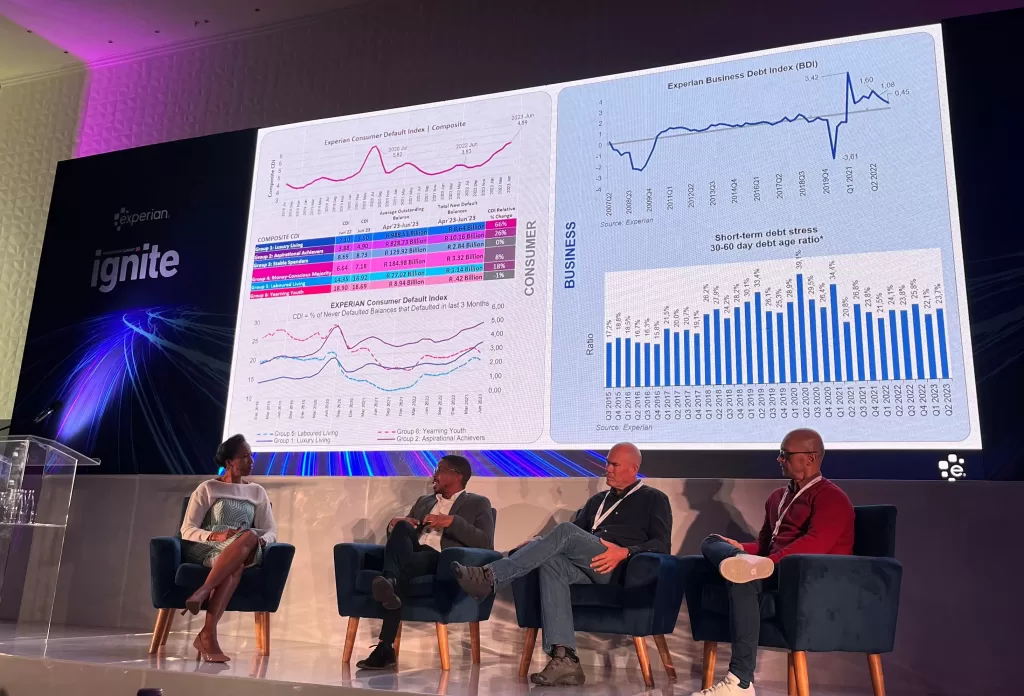Johannesburg,
Experian South Africa hosted its annual flagship conference today, bringing together industry guests and subject matter experts under one roof to share insights and trends that continue to shape the evolution of business and consumer behaviour.
This is particularly significant in a macro-economic environment that has been challenging across the board. However, the Innovation Summit demonstrated that businesses have the opportunity to position themselves for growth and resilience by enhancing their data insights, analytics, technology and innovation.
“With the array of choice available for today’s consumer, organisations are investing more in data driven customer insights to create relevant products and services that can be better targeted at the right customers. For credit lenders, the affordability decisions made at acquisition are critical to delivering growth. With the advent of Artificial Intelligence and Machine Learning, those decisions around who to extend credit to, can now become a lot smarter,” said Mark Wells, Chief Customer Officer at Experian Africa.
Adoption of Artificial Intelligence (AI) and Machine Learning (ML) a key priority for business
AI and ML are not new wonders, but the application of advanced analytics is reaching new spaces and opening radical changes to processes that have remained largely unchanged for years. AI enables unprecedented analysis that will become essential to ensure precise decision making within risk management and fraud. Moreover, it enables greater operational efficiency through automation which ultimately improves the end customer experience.

“We see that several winning organisations are using a wide variety of data sources and ML to improve the accuracy of their risk models. These two factors are key to creating resilience in the face of rapidly changing conditions. Machine learning can help businesses take advantage of the vast quantity of available data that grows exponentially each day. It allows businesses the flexibility to integrate new data sources quickly and understand the implications of this data in real-time. This in turn enables greater insight, agility, and adaptability in responding to rapidly changing macroeconomic conditions, market and customer risk and fraud threats,” said Francois Grobler, Chief of Decision Analytics.
The ability to implement and deliver new models, rules and strategies at speed can be a competitive advantage with business improvements realised quicker. However, businesses are realising that cloud-based software is a key organisational enabler to accelerate their AI and ML programmes.
Additionally, with an increasingly competitive and cost sensitive market, businesses are under pressure to accelerate the customer onboarding process to drive revenue growth whilst reducing technology costs in support of a stronger profitability focus. At the same time, they need to carefully manage risk, ensure responsible lending, and provide customers with a personalised and affordable product.

“This isn’t possible without advanced software processing the data, making quick decisions, and coming back to the consumer with a decision in minutes. To do this, businesses need an automated way to understand each applicants’ risk profile and onboard the right customers quickly whilst using data and analytics to improve the accuracy of decisions, reduce manual effort and lower cost,” adds Grobler.
Enhancing fraud prevention without impacting customer experience
In an increasingly digital world, fighting fraud is difficult with attacks constantly evolving and becoming more sophisticated. With tactics such as device emulation, credential stuffing and remote access trojans used to target individuals and businesses, additional fraud prevention tools are required.
The top three use cases for AI and ML are data management, credit risk models and fraud risk decisioning. In each one of these cases, AI and ML can provide a step change in the capability of organisations to analyse and interpret data. This allows them to create, test and deploy new models in far less time than what was previously possible. This is particularly relevant in mitigating the threat of fraud where ML allows businesses to continually adapt to the latest fraud patterns without manual analysis from fraud teams.
Recognising that businesses need to lower their fraud levels without impacting conversion rates, Experian created Aidrian, a new cloud-based fraud solution powered by adaptive machine learning which enables businesses to prevent fraud without impacting the customer experience.

Wells adds, “During Experian’s Innovation Summit today, we’ve shared how this powerful modular transactional fraud solution combines a state-of-the-art customised ML model with device fingerprinting to automatically classify transactions with 99.9% accuracy. Aidrian’s ability to differentiate between legitimate customers and fraudsters can significantly reduce false positives, helping to generate up to 15% more revenue for clients.”
Aidrian’s ML model is self-learning, and re-trained with new data every two weeks, allowing increasingly accurate recommendations over time. The high level of accuracy helps businesses to prevent fraud, while providing genuine customers with a smooth and frictionless checkout or onboarding process.
“With annual fraud losses sharply increasing, the use of ML is fast becoming essential to combat fraud. By adopting the latest technology, businesses can considerably reduce the volume of manual reviews, ease pressure on fraud teams and improve their customer experience,” concludes Wells.





























